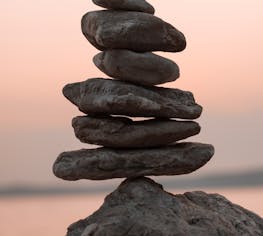How do you feel when you look up from working on a project, or performing a task, and it's as if time and space have miraculously collapsed? But instead of feeling guilty, you feel a sublime sense of happiness because you've accomplished something of meaning?
Flow is the seminal work on entering a "flow state." Psychologist Mihaly Csikszentmihalyi explains that "optimal experiences," where we're fully immersed in a task, are when we encounter the most profound form of bliss.
Through years of empirical research, world-renowned psychologist Mihaly Csikszentmihalyi gives us another perspective on the need to create meaning in our own lives. He's from the school of thought where meaning is the key to a life that's fulfilling and rewarding. However, what exactly is meaning? For Viktor Frankl, it's a sense of a greater purpose, and finding the resilience to combat struggle. For Héctor García and Francesc Miralles it's based on the Japanese concept of ikigai.
Csikszentmihalyi argues that we're in a constant state of anxiety, and despite the abundance of wealth and things we have at our disposal, we're not truly happy. He suggests that happiness comes from having more control, and being productive and useful.
We'll briefly look at one of the most important and significant books on flow, and how mastering our productivity and creativity results in an abundance of happiness. And flow isn't just about finding joy in tasks; it filters into every aspect of our lives.
The Seasons of Discontent
Why are we so unhappy, despite having more options, more choices, more stuff? Mihaly Csikszentmihalyi provides two reasons for our growing discontent and anxiety.
As we know from A Short History of Nearly Everything, Sapiens, and Homo Deus, the universe is a harsh place to survive. Humans have had to fight for our survival amid a range of obstacles and challenges, such as famine, war, drastic climate changes, plagues, and diseases.
Our discontent has been tempered somewhat by narrative. We've created myths and stories, and when we have to do things we don't enjoy, we're told "it's for our benefit" or that it's a crucial "learning experience." Discontent arises because our reality doesn't match up to the narrative we've been peddled. We can see this in numerous historical events where uprisings have occurred. Although Marie Antoinette didn't actually utter the words, 'Let them eat cake'! One can imagine how the starving masses must have felt when they witnessed a couple with so much prosperity and wealth, while they were battling to stay alive. Discontent boils over when people are told that everything is fine when it clearly isn't.
Csikszentmihalyi states that when the proverbial penny drops and we realize that life is challenging, we overcompensate or apply metaphorical bandaids to the situation. Often we sweep things under the rug, deflect by turning towards consumer items and instant gratification, or focus on building up career success. We might doggedly set about solving our problems by applying short-term solutions such as a fad diet or an adventurous hairstyle. We may even turn to recreational drugs or alcohol to numb the pain. Oftentimes we choose to give over the reigns and focus on religion to give control to a higher being. And, while these distractions may help for a while, the problems still lurk beneath the surface. Hence, anxiety and apathy creep in, and we start to question our beliefs about the world we live in.
The bottom line is we have to accept that challenges are never going to disappear. As we solve one problem, another one always appears. In many ways, life is filled with Sisyphean tasks, and there are certain obstacles and threats that we have to accept as part of life. As we eradicate one disease, another will crop up, and as one conflict ends, another one begins.
To live a more fulfilled life, we have to learn to live in the present and see bliss and beauty even when life is hard. This change in mindset helps ward off feelings of discontent and anxiety, and redirects our energy towards meaningful experiences.
Blissful Optimal Experiences
Most of us like to have control and order over our lives, and don't do well when surrounded by chaos. When things are chaotic, we battle to focus. However, when we're genuinely focused and absorbed in something, we're at our most tranquil. When we're immersed in a task, we can shut off the world around us, and just enjoy the experience that we're undertaking.
Adult coloring in books have become somewhat of a trend, puzzles are making a resurgence, and Lego seems to be more popular with adults than kids. However, getting into a state of flow isn't just about the things that we enjoy to take our minds off the chaos around us. We can find this same sense of flow when we're working hard and pushing ourselves to the limit. Athletes push themselves all the time, and in doing so, they reach a state of optimum flow. And, while this hard work and practice may be physically and mentally taxing, it's an optimal experience most will never forget because it sets them up for greatness.
Switching to Silent
Tangents, distractions, noise, bright lights, alerts, reminders. How many times have you walked into a room and forgotten why you're there, and then ended up doing something you had no intention of doing? How many times do you go down rabbit holes?
Mastering our consciousness is one of the most crucial things we can do to be happy. And, while a lot of our daily lives are taken up with unconscious acts, we need to cultivate our consciousness so that we can engage in flow.
Consciousness is the state where we're aware, and in cognitive control of our actions, thoughts, and perceptions. However, a lot of what we do on a daily basis, our habits, for example, aren't governed by our conscious. The brain processes 125 bits of information per second, which is about half a million per hour. Our brains are capable of tremendous things, but they also learn to process information unconsciously to conserve energy. This is why tasks such as reading are complex when we first begin, but become easier with practice and time. We're continuously processing information, and when we learn a new skill, it can be exhausting. Csikszentmihalyi argues that we seek out relaxing experiences to switch off for a reason. We can't operate at total conscious capacity for too long.
Nicholas Mirzoeff famously said that 'modern life takes place on screen.' We are visually saturated, and throughout the day, we're continuously bombarded with things vying for our attention. Being conscious is exhausting because we have to be aware and process everything that's in front of us. When the world around us is busy, our consciousness goes into overdrive, and we try to form order out of the chaos, which makes us anxious. Furthermore, any information that doesn't fit in with our goals, anything superfluous, is distracting and often tempts us into that dreaded web of procrastination. Csikczentmihalyi refers to this as "disorder in consciousness" or "psychic entropy."
We hit this state of "disorder in consciousness" or "psychic entropy" when we're faced with a task, but we're interrupted by emails, social media, a message, a phone call, the temptation of the kettle and a cookie. 'Just a quick ten-minute break' we might tell ourselves. When we can't focus, we can't get into a state of flow. And flow is everything.
Reaching a state of flow means focusing our energy on one specific task to achieve "inner order," or "order in consciousness." When we have too much going on, we have no sense of order, and we can't achieve anything of real significance. In short, we find ourselves wasting time and being busy doing nothing.
Many people have said that we live in an "attention economy," where our minds and what we focus on have become hot commodities. On a daily basis, there are so many influences trying to grab our attention, and we need to learn how to shut this off, and focus our attention more meaningfully.
Going With the Flow
Harnessing the power of flow and training our attention spans has many benefits. For example, how do you feel when you've spent a day mindlessly scrolling through the Internet and have nothing to show for it?
Cultivating a work ethic that centers on flow, makes us happier and more self-confident. Reaching goals and seeing genuine improvements and results makes us so much more fulfilled, excited, and less anxious. Furthermore, even the most menial of tasks become less tedious when they form part of a big picture. A lot more joy can be cultivated in mundane tasks if they add to the larger goal.
What's more, individuals who are able to maximize flow and realize their potential are generally a lot more complex. They are constantly upskilling, learning, and capitalizing on knowledge, and they are more balanced, fully conscious, and happy. One of the most distinguishable features of engaging in the process of flow, is that it's enjoyable and immensely fulfilling.
This marks an important distinction between pleasure and enjoyment. Pleasure often revolves around instant gratification and novelty, and it doesn't have a sense of longterm fulfilment. Often pleasure tricks us. While you may feel pleasure while scrolling through the Internet or binge-watching a series, this has very little impact on your longterm happiness. Pleasure seldom crosses over into personal growth. On the other hand, enjoyment takes a lot more effort and is linked to delayed gratification, and experiencing more of a journey-based approach.
Enjoyment is reached when we stretch ourselves, and accomplish goals we didn't think were possible. Have you ever had that feeling where you've set yourself a challenging goal and then achieved it? It's one of the most satisfying feelings in the world, and the memories of the achievement last forever. Enjoyment comes from pushing ourselves to learn new skills and to improve ourselves.
Csikszentmihalyi talks about the nine aspects of enjoyment. While we may not experience them all at once, nine common factors differentiate enjoyment from pleasure.
When we're enjoying something, we're focused on the task. We lose track of time and just focus on what we're doing. We find enjoyment in things because there's no clear goal in mind. We may begin something and continue with it for an extended period without thinking about finishing it. Enjoyment also comes with immediate recognition. People, or ourselves, can immediately recognize what we've done, and we find immense enjoyment in this. When we set out on a task that we enjoy, we have the necessary skills, but we're also learning more along the way. We have a sense of order and control, and because we're so engrossed, we feel as if we're somewhere else. Experiencing enjoyment means that all other feelings melt away, time and space collapse, and our mind is entirely transfixed on the task at hand. All anxiety and feelings of being self-conscious go away, and because of how flow makes us feel, we seek out the experience again and again. Enjoyment has a wonderful "autotelic" aspect, which makes us want to pursue it.
The Stages of Flow
Flow happens in a series of stages.
When we start something for the first time, we gain enjoyment from the fact that we like and engage with the experience. Every slight improvement seems like a win, and we keep going because it appears as if we're mastering a new skill. This is stage one.
The problem is, once we reach our comfort zone and master the basics, leveling up seems daunting. It's at this point where we often get bored because we can't get past a barrier, or we become anxious because we don't think we'll improve fast enough or well enough. This is why we need to push towards the second stage. We need to stretch ourselves just enough to make it challenging, but not too much that we feel like we'll never get there. Hence, developing the right goals that stretch us enough, but don't push us too much are absolutely crucial.
Some people find it easier to get into flow. Depending on their context, experiences, and ingrained habits, some people are more naturally disposed to getting into a flow-like state. We call these people "autotelic," and they're able to set goals, move forward with them, and adapt and adjust them when needed. They also find it easy to analyze their environment and tinker with their work levels and goals accordingly. Furthermore, they find it easier to find the discipline to concentrate and work hard to have a varied range of interests. When life gets autotelic people down, they're able to adapt because they can find enjoyment in a range of different pursuits. They seek out enjoyment and don't just wait for good things to happen to them.
The Flow Framework
It's possible to find order in the chaos, and there is a methodology for reaching a heightened level of flow, if it isn't something that comes naturally to you.
Firstly sit down and write down your goals. Then prioritize them. Write down your bigger goals, and thereafter write down any smaller goals you need to get there. Once you've listed your goals, think about how you want to progress. It's important not to be too optimistic about your progress or you'll lose momentum. You want to set achievable goals that stretch you just enough without making you anxious. And remember, you also want them to be big enough that you aren't bored.
We tend to focus more when something is challenging, so if you're bored, you need to up your game. An excellent way to alleviate boredom is to understand all the elements of the task you want to accomplish. The more you understand your objective, the more passionate and inspired you'll be. Remember that most tasks include a range of different skills. View your project as a sum of its parts and embrace learning about all of them. And remember the golden rule of boredom. If you find yourself growing bored, you need to adjust what you're doing. Flow is a self-reflexive process – your skills and mindset have to evolve simultaneously.
Do More Deep Thinking
To prime yourself to get into a state of flow, you have to engage your mind. Csikszentmihalyi suggests writing, engaging in history, and seeking out tasks that activate the brain.
Writing doesn't just have to be prose. Writing poetry, letters, journal entries, or even a crossword puzzle are fantastic brain exercises. Crossword puzzles are particularly brilliant because they use a range of skills and also have a sense of accomplishment. You'll also find that the more crosswords you do, the better you'll get, and eventually, you'll find yourself in the zone.
Having a sense of history is also pivotal. Knowing where we come from, learning from the experiences of others, developing empathy, and engaging with the past make us more conscious. And, it's not just about reading history, but going to art galleries and museums, and sharing stories with family.
It seems obvious that we're in a state of flow more often when we're at work. However, we can adjust our leisure activities and use our "off-time" more productively. We experience flow 54% of the time at work, whereas this statistic drops to 18% when we're experiencing downtime. We need to be aware of this because we are apathetic and lethargic when we're not concentrating or productive. The more used to this state we get, the more difficult it is to change.
The good news is we can also experience flow in relationships. Children find this a lot easier to do because they engage in immersive imagination-based games. So, adults, it may be time to embrace your inner child and completely immerse yourself in your friendships, play games, work on projects, collaborate, have meaningful exchanges, and be fully present.
In Conclusion
What's your purpose in life, and what goals do you need to set to achieve this purpose?
Flow is a book about developing a sense of harmony in a world that's chaotic and a little scary sometimes. The experience of flow allows us to escape from the chaos and to enrich our lives by engaging in activities and pursuits that we find meaningful and rewarding.
We all want a balanced life, and this doesn't come from applying temporary solutions to problems or seeking out instant gratification. Proper balance, harmony, and meaning come from finding purpose.
So seek out your purpose and focus on yourself and the world around you. Think about all of the things that make you unique, and the traits you have that can add value. Maybe it's time to pursue that dream or try something new?
Remember that you're a conscious, autonomous individual who has agency and one life on this planet. So take a long hard look in the mirror, observe your value, and then get to work. Of course, it won't be easy, so you'll need to manage your expectations. You probably won't be exceptional straight away, and you certainly won't find getting into a state of flow a simple process. It'll be frustrating. But the message is you can't do everything, but we can all do more. Stagnating and wasting creativity and opportunities is the root of unhappiness.
There is no time for boredom; we need to adjust.




